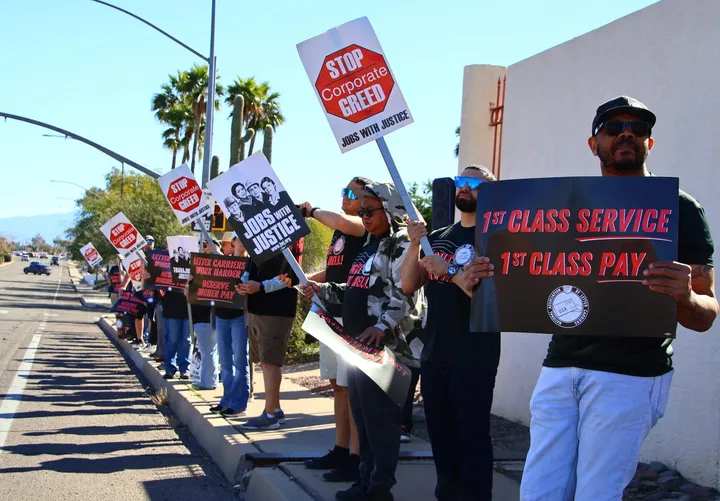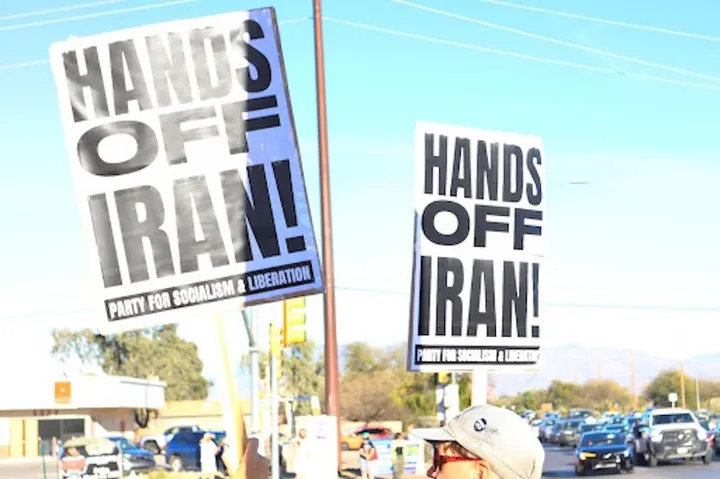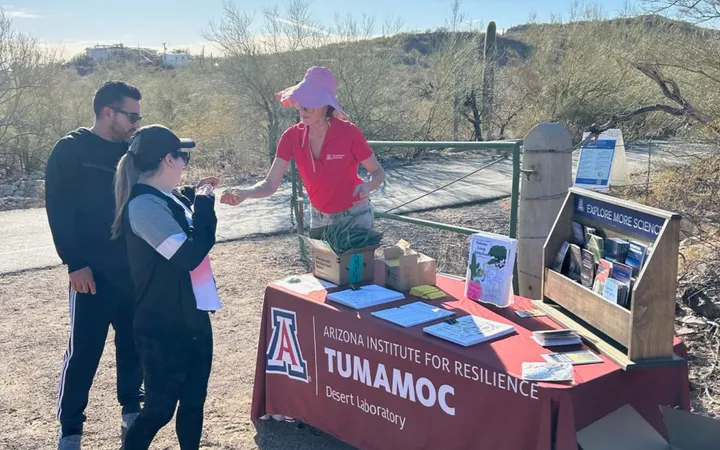South Tucson volunteers fast to highlight Gaza crisis
Four South Tucson volunteers, including city leaders, are undertaking a 40-day water-only fast to protest U.S. weapons funding and draw attention to the humanitarian crisis in Gaza.
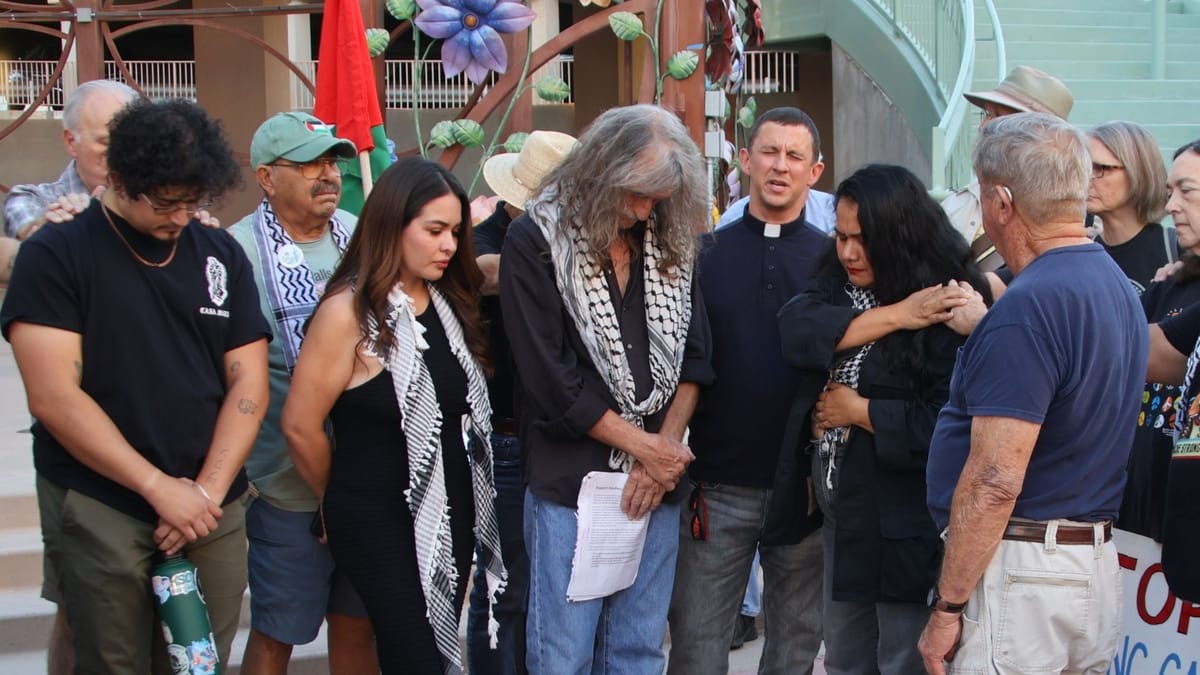
Four volunteers from Casa Maria Soup Kitchen, including three members of its executive team, have launched a 40-day water-only fast to protest U.S. weapons funding and highlight the humanitarian crisis in Gaza, where more than 2 million Palestinians face displacement and famine amid ongoing conflict with Israel.
Among those participating in the fast are South Tucson Mayor Roxanna Valenzuela, South Tucson City Council members Brian Flagg and Pablo Robles, and longtime community aid worker Glenda Avalos.
“More than 64,000 Palestinians have been killed in the last 2 years and many have been killed with bombs funded by U.S. taxpayers made right here in Tucson by Raytheon,” organizers wrote in a letter of intent posted to Casa Maria’s Instagram page.
The group is asking U.S. senators Ruben Gallego and Mark Kelly to commit to vote in support of the Israeli Arms Embargo Bill sponsored by Sen. Bernie Sanders.
Gallego and Kelly recently signed a letter asking Secretary of State Mark Rubio to resume medical and humanitarian visas for civilians in Gaza. They’ve also called for the current administration to demand that Israel allow a surge of infant formula to enter Gaza.
Neither Kelly nor Gallego responded to Tucson Spotlight’s request for comment regarding the bill.
Valenzuela was the first person to sign on to participate in the fast, which began Oct. 1.
“There's no issue that has brought me to my knees like this issue,” Valenzuela said. “I see my children suffering in those images, and it breaks my heart that it is us here in Tucson that are manufacturing these weapons. We don't want blood in our hands.”
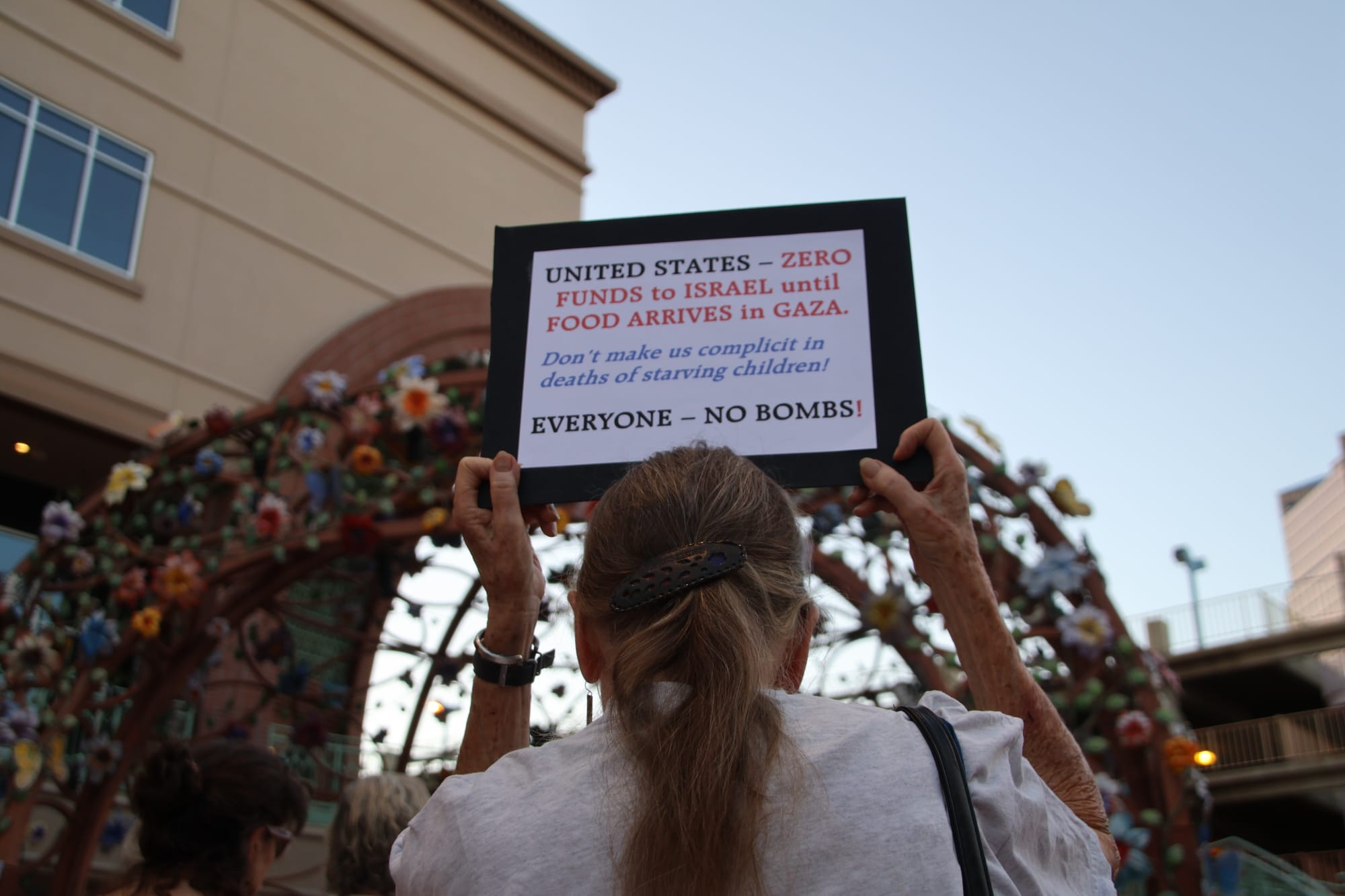
Last year, the City of South Tucson was the first city in Arizona to call for a ceasefire in Gaza, followed shortly after by Nogales. Tucson’s city council voted not to move forward with a ceasefire resolution.
“I think our faith does compel us to speak, and we want to call out everybody that has been bestowed with the responsibility to represent us, to speak up,” Valenzuela said. “Many elected officials remained silent. We need to hold those that we have entrusted with representation to not be complicit, especially elected officials.”
Participants will fast in shifts of 10 days each, with different members taking turns, ultimately completing a total of 40 days of fasting.
Casa Maria hosted a community prayer service outside St. Augustine’s Cathedral the night before the fast began, inviting community members and local religious leaders.
“I can't call myself a person of faith and continue to be complicit in something that goes against every single thing, every single being of who I am,” Avalos, who has served South Tucson for over 15 years through ministry, told Tucson Spotlight.
Avalos said her experience witnessing food insecurity in Tucson has inspired her to take action beyond her local community.
“It's a deeper conviction to stand for those who can't stand,” she said. “A deeper conviction to advocate for those who can to lift up the voices of hurting and oppressed communities all across the world and in Gaza.”
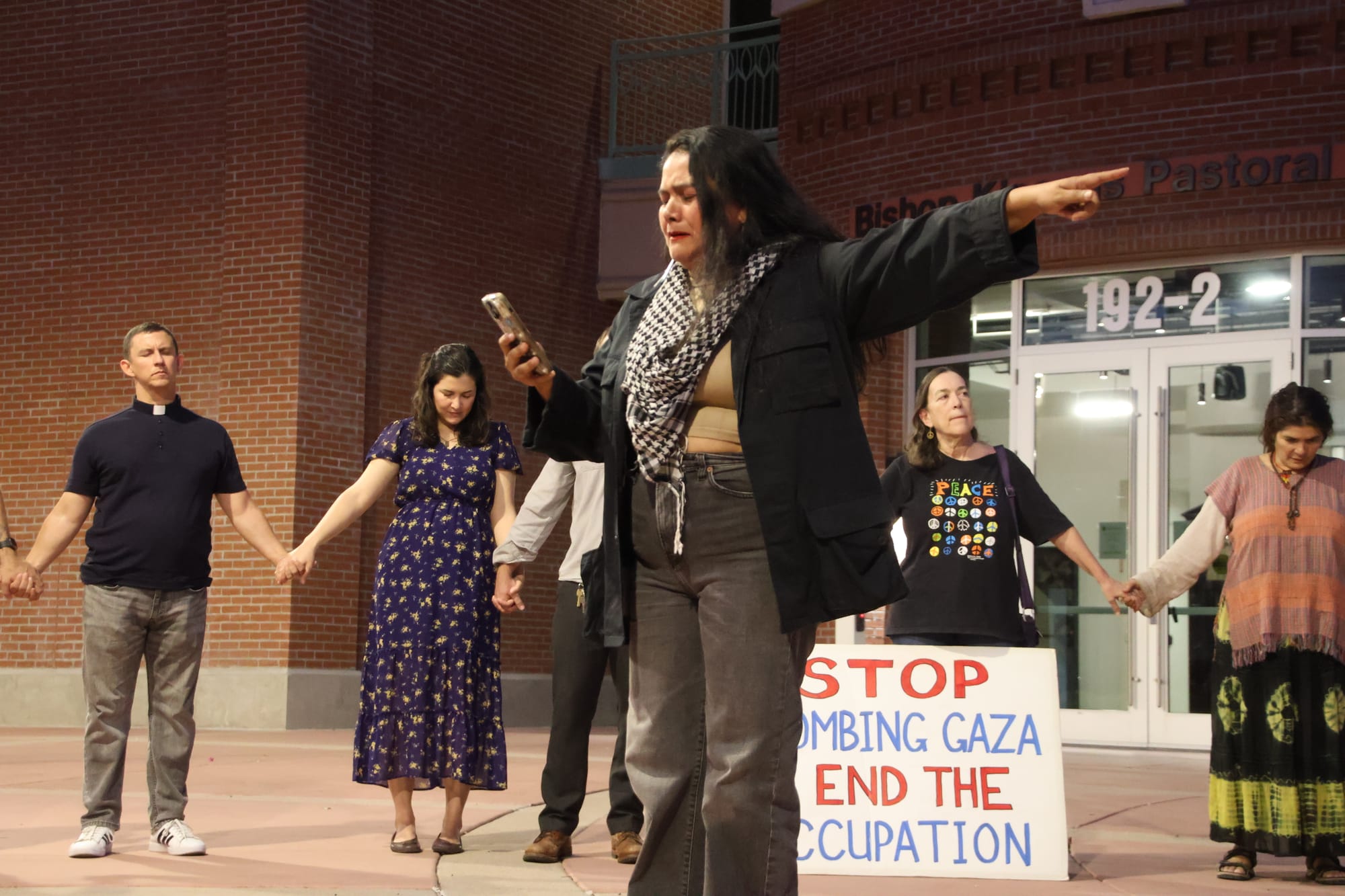
Like Avalos, Pablo Robles said his commitment to social justice drew him to participate in the fast. He has previous experience working with organizations that provide social services and has always been drawn to this work.
“It would be irresponsible of me to not (fast) and tout myself as a social worker. It's this internal need to feel like I'm doing something,” he said. “The raw picture of what's really happening in our name, with our money, with our taxes, it's stomach-churning.”
As the group readied themselves for the fast, Avalos explained what motivated their commitment.
“We understand that there is going to be a struggle within it, but even with that, it does not compare the struggle, the pain, the agony, does not compare to our brothers and sisters in Gaza,” Avalos said.
The group plans to hold vigils at the intersection of Stone and Pennington during morning and afternoon weekday rush hours for the first 20 days of the fast, after which they will relocate outside Raytheon.
Flagg, who has been involved with Casa Maria since 1983, led the service and stressed that the soup kitchen’s work extends beyond charity to justice.
“Every day at Casa Maria, we serve 400 lunches. We serve 80 family food bags, and life goes on, but life can't go on just like normal,” Flagg told the group. “With Gaza being the moral issue of the day, how can we just stand here and watch? It's wrong, it's immoral, and it's a sin that cries out to heaven, and people of faith need to answer the bell and respond to it, and in whatever way we're inspired to respond to things.”
Members of the religious community also spoke at the event. Reverend Bart Smith, interim pastor of Immanuel Presbyterian Church, reflected on the symbolism of the Christian cross:
"That death toll … 65,000. That's a lot of crosses that are nailed together with wood and with nails from Tucson, Arizona,” he said. “The question is, do we make the cross a symbol for that, or do we make it a symbol of hope and radical love?”
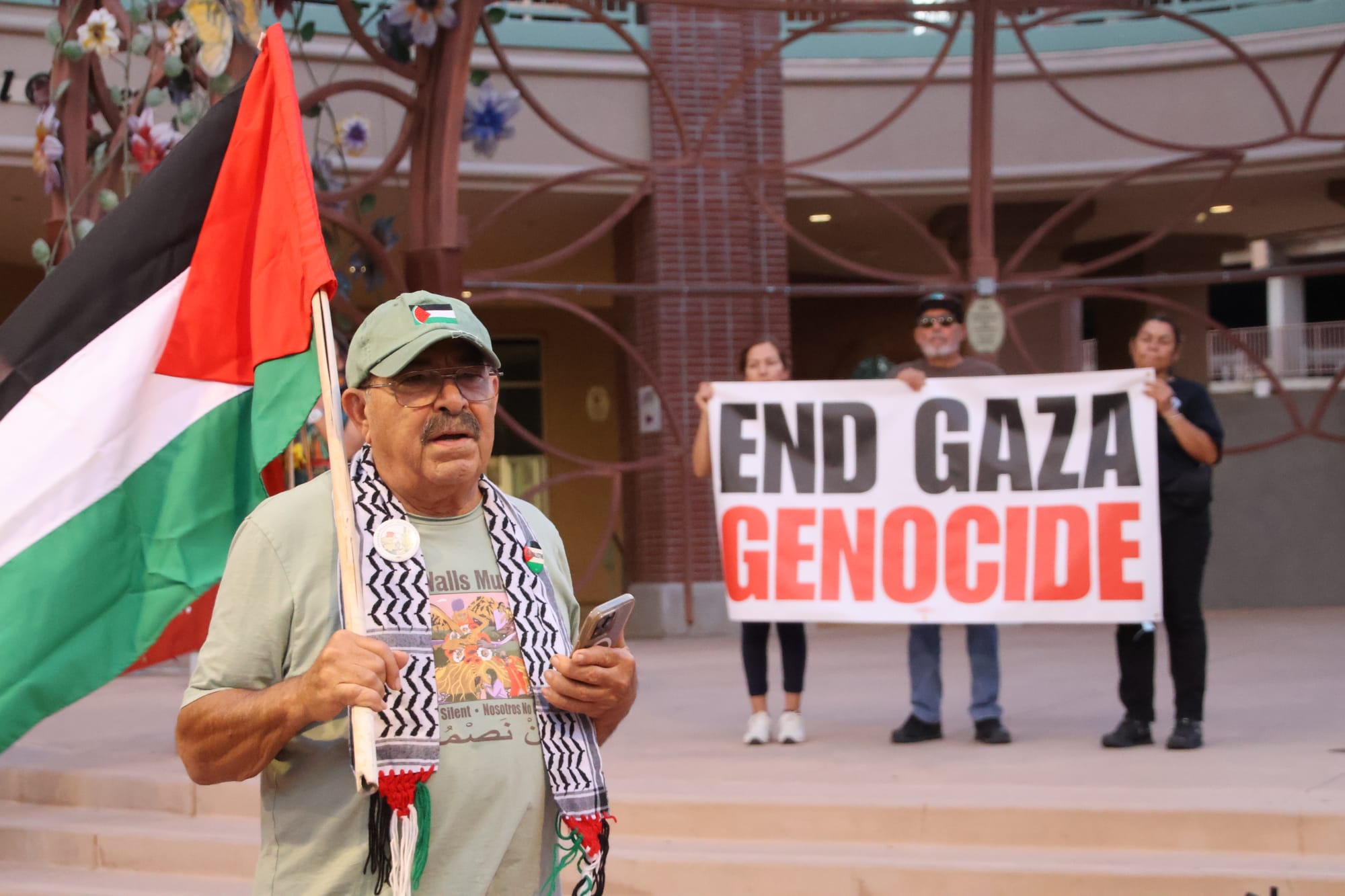
Reverend Seth Wispelwey, minister of economic justice of the United Church of Christ, told the group that this is not his first experience protesting large institutions associated with the conflict.
“Almost two years ago, the Raytheon CEO was heard crowing on an earnings call about what this would mean for their bottom line. A month after that, three dozen of us, myself included, were arrested for singing and praying and holding space at the entrance of Raytheon's headquarters in the University of Arizona Tech Park,” Wispelwey said. “The University of Arizona is a public university. We pay for that just as we pay for the weapons and every single day for two years.”
Community activists were also invited to speak. Felice and Jack Cohen-Joppa are founders of The Nuclear Resister, a nonviolent group advocating for peace and the elimination of nuclear weapons.
The pair said their group does not take issue with the people who work at Raytheon.
“We oppose the militarism that exploits this need, claiming to develop our own community at the expense of others around the world,” Jack Cohen-Joppa said. “It's about commerce, not defense. It's about profit, not security. Is this how we honor our veterans, educate our children, care for our neighbors, elevate local culture, and for how long can we continue to develop our community at such a great cost to others around the world?”
Mohyeddin Abdulaziz is a Palestinian Arab American who immigrated to the United States in 1978 and later cofounded the Arizona Palestine Solidarity Alliance. In 1967, residents of his home village, Imwas, were forcibly expelled to make way for what is now Israel’s Canada Park.
“The Palestinian people have endured various campaigns of violence, destruction (and) displacement. For thousands of years, the Palestinian people have refused to disappear,” he said. “Because of the Palestinian people, because of my people, I am never prouder than now to say I am Palestinian.”
Topacio “Topaz” Servellon is a freelance journalist based in Tucson. Contact them at topacioserve@gmail.com.
Tucson Spotlight is a community-based newsroom that provides paid opportunities for students and rising journalists in Southern Arizona. Please consider supporting our work with a tax-deductible donation.

